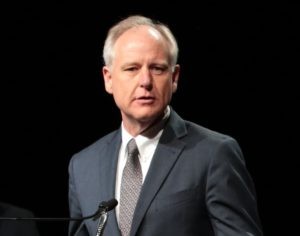The Cooperative Baptist Fellowship’s first second-generation executive leader urged churches to increase financial support to ensure that work started in an era of strife within the Southern Baptist Convention continues to flourish after veterans of the SBC holy war move off the scene.
Paul Baxley, elected earlier this year as fourth executive coordinator of the moderate Baptist network formed in 1991, said in his report to the 2019 CBF General Assembly June 21 that while there is much to celebrate, the 1,800-church network faces challenges heading into its fourth decade.

Paul Baxley
“Cooperative Baptist Fellowship is not unlike most denominational communities, not unlike most congregations,” Baxley said. “Our revenue has never recovered from where it was before the Great Recession.”
“So now we have to make decisions as a Fellowship,” said Baxley, former pastor of First Baptist Church in Athens, Georgia. “We need to decide how deeply invested we are in this work God has given us to do together, and at the same time we need to be listening to the voice of the Spirit to guide us in what are our most faithful uses of the resources that are generously given to further the mission of Jesus through the Cooperative Baptist Fellowship.”
Baxley, a past member of the CBF Governing Board, urged cooperating churches to aggressively promote the Offering for Global Missions, which needs $4 million a year to sustain the work of field personnel and is running behind receipts the same time last year.
He also requested churches preparing budgets for the coming year “to consider increasing your unrestricted support for the Cooperative Baptist Fellowship.”
“Our Fellowship has chosen in the past to support the life of our Fellowship through unrestricted giving,” Baxley said. “I know of no other way to say it, and I can understand if it sounds countercultural in a world that prioritizes designated giving, but if we are going to continue to have the kind of Fellowship that we have celebrated for years in the days to come, I need to ask you to prayerfully consider whether your congregation is being called to increase that support.”
Unlike his predecessors, who were all involved in efforts to oppose a fundamentalist takeover the of the Southern Baptist Convention launched in 1979, Baxley was in college when meetings in 1990 and 1991 led to formation of a new way of doing missions, theological education and other cooperative ventures.
“Sometimes when I hear people talk about the decisions that were made to start the Cooperative Baptist Fellowship, I hear it described as a decision made out of an experience of pain, an experience of struggle,” Baxley said. “As somebody who was not in that room, I have a different perspective on what happened in those days.
“I see it as a remarkable act of courageous faith, where a few people came together — who if they thought much longer might have decided otherwise — and decided to give generously and risk sacrificially and hope daringly to bring a new community of God’s people into being, even though better judgment might have encouraged them to do otherwise.”
“This community did not come to life because of an accident,” Baxley said. “It did not come to life because there were no other options. This community was founded because a group of people decided it was God’s call and it was worthy of risky, daring, ambitious, generous support.”
“Do we have the same kind of daring faith, the same kind of generous heart, the same kind of resurrection confidence to allow us to come together again in new ways?” he asked. “Because our Baptist witness has never been needed as much as it is today.”
“There is a uniquely Baptist distinct Christian witness that needs to be offered in our communities and in our world, and we are uniquely prepared to offer it,” Baxley said.
Previous stories:
CBF not immune from abuse, leader says, but isn’t saddled with patriarchal theology of the SBC
CBF to vote on deficit spending plan
